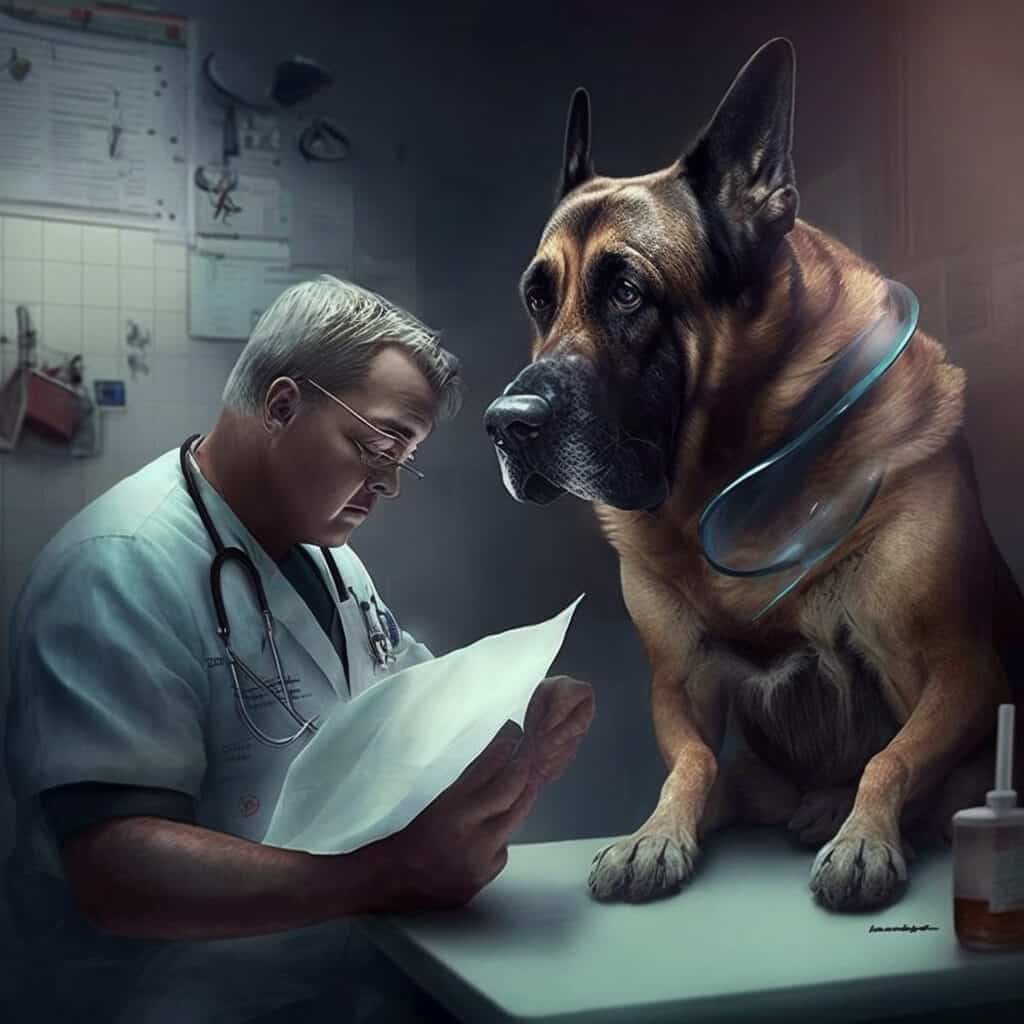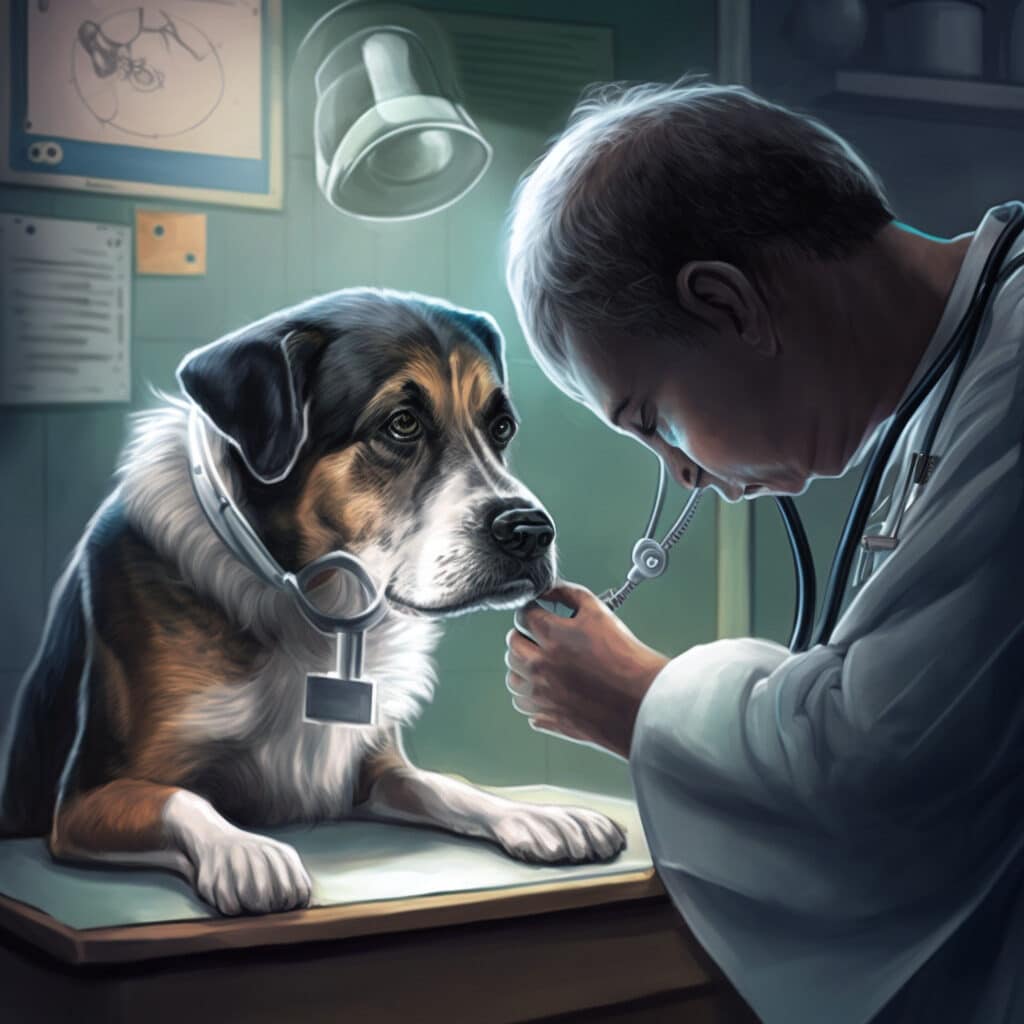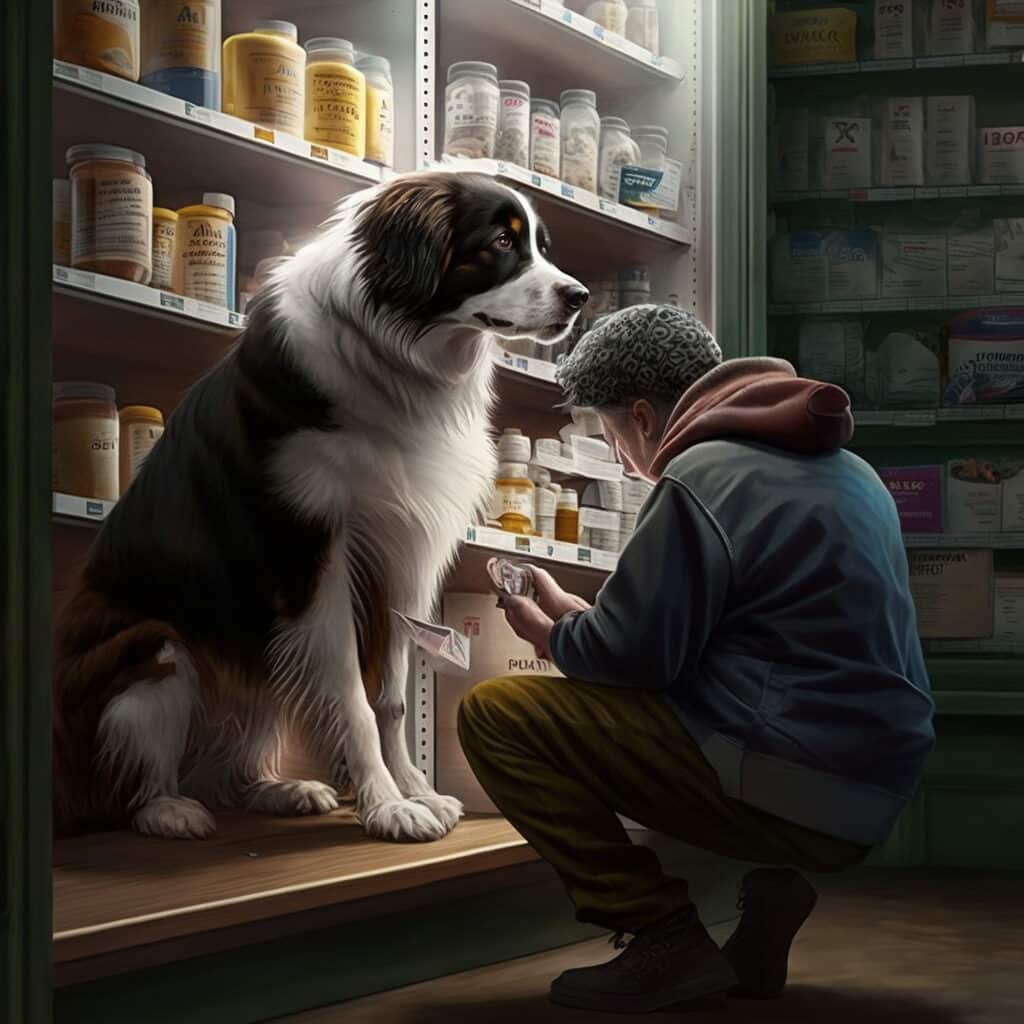Table of Contents
Best Dog Food for Dogs with Colitis
It is often asked, what is the best dog food for dogs with colitis? Well, Colitis is a common gastrointestinal disorder in canines and can be caused by many different factors such as stress, poor diet, parasites, bacteria and viruses. The symptoms of this condition can vary from mild to severe but typically include diarrhea, bloody stools, vomiting and weight loss.

Finding the right food for your dog's specific needs can help alleviate these symptoms and keep them comfortable. In this article we will explore the best type of food for dogs suffering from colitis and how it can make an impact on their health.
The first step to finding the right food for your pup is understanding what nutrients they need most when dealing with colitis. Dogs that have colitis require extra fiber which helps slow down digestion so that more water can be absorbed into the intestines thus reducing inflammation associated with colitis.
They also need high-quality proteins to maintain muscle mass while providing essential amino acids like L-glutamine which help support gut health and healing. Additionally, omega 3 fatty acids are important due to their anti-inflammatory properties which may reduce symptoms caused by colitis.
When determining the best dog food for dogs with colitis there are several things you should consider such as ingredient quality, nutrient content, digestibility and palatability.
Quality ingredients are paramount since low-grade fillers won’t provide any nutritional value nor aid in symptom relief; instead opt for wholefoods like fresh vegetables, fruits and lean meats whenever possible.
Nutrient content must meet AAFCO standards ensuring a balanced meal specifically designed for canine needs including proper levels of vitamins minerals fibers etc..
Finally, digestibility matters greatly since poorly digested diets could worsen digestive issues related to colitis; therefore, look out for highly digestible formulas made from easily absorbable carbohydrates like white rice or potato starch along with good sources of protein like fish or chicken meal which both contain glutamine mentioned before.
There's no one size fits all solution when it comes to finding the best dog food for dogs with colitis, however knowing what ingredients are beneficial (and harmful) when managing symptoms makes finding the right product much easier!
Read on further to learn about some great options available today that offer superior nutrition tailored specifically towards pups battling this condition!
Types Of Dog Food for Colitis
Do dogs with colitis need special food? Absolutely. When it comes to dietary needs for a dog suffering from colitis, owners should look for foods that address the root cause of the condition and can provide relief from associated symptoms. While there is no one-size-fits-all solution, some general principles apply when selecting the best diet for your canine companion.

Dry dog food may be an appropriate option in some cases, but many veterinarians recommend a hypoallergenic diet or limited ingredients diet with novel proteins as the most effective choice for dogs with colitis.
This type of diet helps reduce inflammation and provides easily digestible nutrition tailored specifically to canine digestive systems. Veterinary diets formulated by experts are also available which ensure optimal nutritional balance while helping to minimize flare ups of colitis.
No matter what type of diet you choose, always consult with your veterinarian first before transitioning your pet’s food. They will help you determine if any other medical interventions are needed alongside dietary changes and can recommend specific diets depending on the severity of your pup's condition.
With careful consideration and planning, finding the right food regimen can go a long way towards keeping your pooch happy and healthy despite their diagnosis – paving the way for better days ahead! As we move onto considering nutritional requirements for dogs with colitis, let’s explore how these guidelines must be considered during mealtime planning.
Nutritional Requirements for Dogs with Colitis
When it comes to best dog food for dogs with colitis, a balanced diet is essential. To ensure your pup receives all the essential nutrients needed for health and wellness, it’s important to consult a veterinarian or veterinary nutritionist about what type of food may be best suited for their condition.
Royal Canin makes some great dry kibble diets specifically designed for pets with digestive issues that can help provide optimal nutrition while minimizing flare-ups.

In addition to selecting the right food, there are other aspects of canine nutrition worth considering when trying to soothe symptoms associated with colitis in dogs. Dietary fiber has been shown to reduce inflammation in the gut and aid digestion, but too much can make matters worse by leading to weight loss or further irritating an already inflamed colon.
As such, it's important to talk with your vet before making any major changes in your dog’s eating plan. Food allergies may also contribute to gastrointestinal problems, so if you suspect this could be at play then speak up—you might need to switch foods or add additional supplements like fish oils into his diet.
It’s no secret that proper nutrition plays an integral role in keeping our four-legged friends healthy and happy throughout their lives. With careful consideration given towards dietary changes as well as close monitoring from a knowledgeable professional, managing colitis in dogs can become far more manageable over time!
Symptoms Of Colitis in Dogs
Do you suspect that your pup may have colitis? It is important to be aware of the symptoms associated with this condition in order to provide them with the best care possible. As a dog owner myself, I understand how canine colitis can affect any dog – regardless of breed or size. Recognizing and understanding its signs is key to finding the right treatment options for your pet.
The most common symptom of colitis is bloody diarrhea. This indicates that there has been some kind of damage to the lining of their intestines. Other general signs include frequent trips outdoors, straining during bowel movements, abdominal pain and bloating, loss of appetite, weight loss and lethargy.
If left untreated, these symptoms will only worsen over time so it's essential to act quickly if you notice anything out of the ordinary when it comes to your pup’s health.
When treating colitis in dogs, finding an appropriate diet plan is one of the first steps that should be taken after considering potential underlying causes and making necessary lifestyle adjustments such as ensuring adequate exercise and rest times for your pup.
In terms of dietary changes, switching from kibble-based food products to homemade meals made with high quality proteins can help improve digestion and reduce inflammation in their digestive tract.
However, selecting fresh ingredients tailored specifically for dogs struggling with gastrointestinal issues like colitis can often prove challenging due to lack of knowledge about proper nutrition for pets suffering from this condition.
To make sure you are providing your four-legged friend with the best option available on the market today, consider seeking professional advice from certified veterinary nutritionists who specialize in formulating diets designed around individual needs based on thorough examination results.
Causes Of Colitis in Dogs
Colitis is a common inflammatory bowel disease in dogs that causes inflammation of the colon or large intestine. There are several possible causes for this condition, including bacterial infections, food intolerance, and allergic reactions. It's important to understand what might be causing the colitis so that it can be properly treated with the right diet.

When trying to determine the cause of colitis in a dog, your veterinarian may recommend blood tests to rule out underlying medical conditions. They may also suggest an elimination trial diet which consists of feeding only one type of protein source as well as one carbohydrate source over a period of six weeks.
This will help to identify any potential dietary triggers that could be contributing to your dog’s symptoms.
In some cases, further testing such as endoscopy or biopsy may be necessary if no obvious dietary trigger has been identified through the elimination trial diet. If these tests reveal evidence of infection or other abnormalities, then specific treatments can be recommended based on those results.
Once the cause of your pet’s colitis has been determined, you can work closely with your vet to design a nutritional plan that meets their individual needs and helps manage their symptoms.
Knowing the primary cause behind your dog’s colitis is essential for finding the best course of action when it comes to managing their nutrition and overall health.
With this knowledge you can begin exploring commercial foods specifically formulated for dogs with colitis and other gastrointestinal issues.
Commercial Foods for Dogs with Colitis
Similar to a puzzle, finding the best dog food for dogs with colitis requires connecting the right pieces. When it comes to commercial foods, there are certain characteristics that will help provide relief from chronic colitis in your pup's large intestine.
Here is a list of four tips to keep in mind when selecting the best option:
1. Look for products specifically designed for animals with colitis or other inflammatory bowel diseases. Hill's Prescription Diet I/D is one example of such a product.
2. Avoid grain-based foods as they can potentially cause irritation and inflammation in the gut lining.
3. Choose formulas made with natural ingredients like omega fatty acids, probiotics, and antioxidants which have anti-inflammatory effects on your pup’s GI tract and immune system
4. Try introducing new food gradually by mixing small amounts into their existing diet over several days to prevent any digestive upset due to sudden dietary changes.
With these points in mind, you should be able to find an appropriate commercial food solution for managing your pet’s condition while providing adequate nutrition as part of their overall wellness plan. Transitioning carefully between different diets will ensure maximum benefit without risk of further complications related to their condition.
Homemade Diets for Dogs with Colitis
Homemade diets can be a great solution for dogs with colitis. When the intestines become inflamed, it is essential to adhere to a bland diet that helps reduce further inflammation and discomfort.

A homemade diet provides control over ingredients and can provide more variety than commercial foods. Depending on what food items are available, there are several options when creating a homemade meal plan for your dog's colitis.
Raw diets are an excellent way of providing nutrition while minimizing intestinal irritation in dogs with colitis. Raw meals should contain muscle meat, organs, bones, vegetables, whole grains such as oats or brown rice, and fruits like apples and bananas.
Sweet potatoes may also be included since they are packed with fiber which aids digestion. It's important to ensure the raw diet you create contains all necessary vitamins and minerals so discuss this option with your veterinarian first before starting your pup off on their new meal plan!
When preparing these meals at home make sure all meats used are fresh or frozen as spoiled meats may complicate the condition even more. Taking extra care during preparation will help keep both you and your pup safe from any potential bacteria present within the food items being cooked up.
Working with your vet to determine the best approach towards improving your pup’s digestive health through carefully tailored dietary adjustments is key to delivering relief from symptoms associated with canine Colitis.
Transitioning into a raw diet for dogs with colitis can offer multiple benefits but consulting professionals beforehand is recommended for optimal results.
Raw Diet for Dogs with Colitis
For many pet owners, the thought of feeding their beloved dog a raw diet is intimidating. Some may be concerned about food safety and nutritional deficiencies, while others are worried about cost or availability. Despite these concerns, there are several benefits to switching your pup to a raw diet for dogs with colitis.
Raw diets offer an array of health benefits that cannot be found in processed foods like Hill’s Prescription Diet. Raw ingredients provide high quality proteins, healthy fats, essential fatty acids and soluble fiber which can help support gastrointestinal health and reduce inflammation caused by colitis.
Additionally, fresh produce provides higher levels of vitamins and minerals than those found in canned or kibble varieties.
The following steps outline how to transition your pup from regular kibble to a balanced raw diet:
1. Begin by introducing small amounts of cooked white rice mixed with boiled chicken into his meals three times per day for two weeks.
2. Gradually increase the amount of raw meaty bones (i.e., turkey necks) each week until you replace all cooked meats with raw ones over the course of four weeks.

3. After this period has ended, switch out the white rice for brown rice which contains more fiber to aid digestion and add slippery elm powder as well as probiotics such as yogurt or kefir once daily during mealtime.
4. Once desired results have been achieved, it is important to maintain balance through continued monitoring and adjusting accordingly if signs recur again later on down the line when necessary.
A properly planned raw-food diet containing free range poultry and wild caught fish can improve digestive issues associated with colitis while providing superior nutrition compared to processed store bought products alone; however caution should always be taken when handling any type of uncooked animal product due to potential risks involved in contamination from bacteria such as salmonella & listeria monocytogenes so proper sanitation practices should always be observed .
With proper planning and care , transitioning your pup onto a safe yet nutritious raw food regimen tailored specifically for pets suffering from colitis could potentially make all the difference between feeling better versus far worse in terms of managing chronic GI symptoms moving forward..
Supplements For Dogs with Colitis
Dogs with colitis can benefit from proper nutrition and supplements to help manage their condition. In addition to the best food for dogs with colitis, there are a variety of treatment options available that may be beneficial.

A veterinarian or veterinary nutritionist will be able to recommend prescription medications, as well as nutritional supplements such as probiotics, omega-3 fatty acids, fish oils, digestive enzymes, vitamins and minerals. All these components work together to support your dog's health and maintain intestinal function.
In some cases, vet prescribed medication is necessary in order to treat the underlying causes of colitis; however, natural supplementation should also be considered due to its potential benefits on overall gut health.
Probiotics have been shown to reduce inflammation and strengthen the immune system by restoring balance within the gut microbiome. Omega-3 fatty acids have anti-inflammatory properties which helps manage symptoms associated with irritable bowel disease (IBD). Fish oil has also been found useful in reducing inflammation throughout the body and aiding digestion problems caused by colitis.
Digestive enzymes aid in breaking down proteins, starches, carbohydrates and fats into more easily digestible nutrients for absorption through the intestines. They can be used in conjunction with other therapies like dietary changes and medications for optimal results.
Vitamins and minerals play an important role in providing essential nutrients needed for maintaining bodily functions including healthy skin coat; they contribute towards overall well being when included in a balanced diet.
Ultimately, it’s up to you – working alongside your veterinarian – to decide what works best for your pup's individual needs so they can live a long happy life!
Recap
It is important for pet owners to be aware of the signs and causes of colitis in dogs, as well as the nutritional requirements for their pets with this condition. Whatever your dog’s needs, there are many commercial foods tailored specifically for dogs with colitis, as well as homemade diets you can create using fresh ingredients.
Additionally, raw diets and supplements may also provide beneficial nutrition that can help reduce symptoms associated with colitis.
I strongly recommend consulting your veterinarian before making any changes to your pet's diet. Your vet will be able to provide guidance based on your dog's specific health needs and ensure that their dietary choices meet all of their nutritional requirements.
Ultimately, selecting the best food for your pup should include careful consideration of both their medical history and current wellness state.
With so many options available today, it is possible to find a nutritious diet suitable for dogs with colitis that helps maintain optimal health and quality of life!
FAQs
What should I feed my dog that has colitis?
The best dog food for dogs with colitis should be tailored to address the dog's unique needs and underlying cause. A diet that is easily digestible, low in fat, and high in fiber is ideal. In some cases, a novel protein diet can help if the colitis is related to food allergies.
Be mindful of weight gain as obesity may exacerbate colitis symptoms. Encourage a healthy lifestyle and consult your veterinarian for specific recommendations based on your dog's condition.
Is wet food better for dogs with colitis?
Wet food can be considered the best dog food for dogs with colitis as it often contains higher moisture content, which may help in maintaining hydration and promoting a healthy digestive system.
Wet food is also easier to digest, reducing strain on the small intestine and limiting the presence of inflammatory cells. Diet changes like switching to wet food should be done gradually to avoid acute colitis flare-ups. Always consult your veterinarian for personalized advice.
What can I give my dog for a colitis flare up?
During a colitis flare-up, it's crucial to address the underlying cause and provide support for your dog's immune system. The best dog food for dogs with colitis may include a bland diet, consisting of easily digestible ingredients like boiled chicken and rice.
Avoid risk factors such as feeding your dog a tennis ball or other indigestible objects. Monitor your dog for sleep apnea symptoms and snoring problems, as they may indicate an irritable bowel syndrome or other health issues. Consult your veterinarian for appropriate treatment options and necessary adjustments to your dog's diet.
What is the best anti-inflammatory for a dog with colitis?
The best anti-inflammatory for a dog with colitis will depend on the underlying cause and the severity of the condition. A healthy lifestyle and an appropriate diet, such as the best dog food for dogs with colitis, can help reduce inflammation.
In some cases, your veterinarian may prescribe medications like corticosteroids or non-steroidal anti-inflammatory drugs (NSAIDs) to manage symptoms. Be sure to consult with your veterinarian for the most suitable treatment plan, considering factors like adult dogs' specific needs and any existing health conditions.



